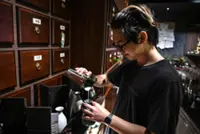When Herve found out he had glioblastoma – the most aggressive form of brain cancer – at the age of 40, he made a deal with himself.
“I said to myself: it is serious, but you are at war – and you’re going to win,” the French teacher, who did not want to give his surname, said.





